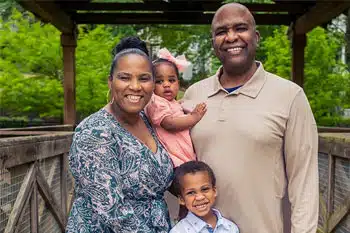
Here, I’ll share why adoption reference letters are important for a safe, smooth adoption.
Table of Contents
- What is a Letter of Recommendation for Adoption?
- Who Should I Ask to Be a Reference?
- Tips for Writing a Letter of Recommendation for Adoption
- What Should I Include in the Reference Letter?
- Recommendation Letters for Adoption
What is a Letter of Recommendation for Adoption?
As hopeful adoptive parents, you want adoption professionals and birth mothers to know you are capable and prepared to raise a child. To do so, you will need to choose a few honest, reliable people you know to write a reference letter on your behalf.
These reference letters will allow the social worker preparing your home study to understand what you’re like. They have a serious responsibility in making the decision to send a child to a new family. Before they can decide, they first need to find out what kind of people the future parents are. What do their friends, family, and colleagues say about them? Are these people trustworthy? Will they be good parents?
Of course, social workers cannot predict the future, but they can do their best to learn as much about the adoptive couple as possible. To meet that goal, a reference letter for adoption is the best way of getting to know the potential adoptive parents better.
Who Should I Ask to Be a Reference?
Words of affirmation from people in your life can go a long way. Depending on the state you live in, your home study provider will ask you for three and five adoption reference letters. Like reference letters for a college or job application, the letter of recommendation for adoption is to help your adoption professional get a better understanding of who you are.
You might be wondering who you should ask to write an adoption letter of reference for a home study. You’ll want to select a variety of people who reflect various relationships. Here are some ideas on who you might ask:
- Close friends you’ve known for at least five years
- Friends you spend time with (especially those who have children or have seen you interact with children)
- Members of your church that you know well
- Your pastor or a clergy member
- Co-workers
- Bosses
- Neighbors
Depending on your adoption agency and the state you live in, you may not be allowed to provide letters from family members. Other agencies may request one letter of recommendation for adoption from a family member or close relative. For example, in Florida, hopeful parents need reference letters from four non-relatives, one family member, and employment references. So before asking anyone to write a reference letter, make sure to check your adoption professional’s requirements and guidelines first.
Once you’ve asked a friend or colleague to write a letter of recommendation for adoption, they might be confused about where to start and what to share. You can share the following tips and information to help guide them along.
Tips for Writing a Letter of Recommendation for Adoption
You’ve just hung up the phone after having a nice chat with a friend who shared some exciting news: they’re hoping to adopt! Even better, they’ve asked you to write a letter of recommendation for their adoption. You already know they’ll make wonderful parents, so you’re happy to help make their dreams of a family come true.
As eager as you are to contribute to your friend’s adoption journey, you might be unsure of where to begin. How might you share that your friend is capable and prepared for parenthood?
You likely already know what a “reference letter” is, having asked for them for college and job applications. However, you may not know why someone would need a reference letter for adoption.
As a couple begins their adoption journey, the first big milestone will be the adoption home study. As part of the home study, they will need to provide their most recent financial statements, undergo background checks and clearances, and furnish a recent medical statement. They will also have a social worker visit them at home to conduct interviews and a home inspection.
Most adoption agencies will ask the hopeful parents for reference letters from personal, non-related contacts as part of the home study process. Reviewing these reference letters is an effective way for the social worker to prepare your friend’s home study and to get to know them.
By getting perspectives from those close to the adoptive couple, the social worker learns more information to use during their evaluation process. While some adoption agencies will provide a reference form for you to complete about the potential adoptive parents, others will ask for letters to be written by their contacts. As you prepare to produce such an important testimony, you want to be sure that it is complete.
What Should I Include in the Reference Letter?
Your friend should be able to provide an idea of what their agency wants in the letter of recommendation for adoption. Dating and signing your document is necessary for a reputable adoption reference letter. Use proper formatting for a reference letter and proofread it for correct grammar and spelling, which will help deliver a clear picture of their family.
Typically, an adoption recommendation letter has three parts. In the first part, share how long and how closely you know the adoptive couple. The second part of your letter is dedicated to their character. In the third part, provide recommendations on whether you think the couple should be able to adopt a child.
Remember that not you’re writing the reference letter to make your friends look better than they really are. Instead, you want to provide a third-party recommendation that will be used in the process for the child they hope to adopt.
The social worker preparing your friend’s home study will look for a few basic items in the letter. If you answer these six questions in your letter of recommendation for adoption, then you will have covered all the basics!
- How long have you known them, and how did you meet?
- How would you describe your relationship with them?
-
- Providing this information to the
-
- gives them a good idea of the foundation of your relationship.
-
- What is their character like?
Include attributes that would be relevant to raising children. In your opinion, what experience do they have with children? How might their qualities have a positive impact on children? Demonstrating that your friend has experience with children is important to include in your letter.
- What is their character like?
-
- How would you describe their relationship with each other?
Before an adoptive couple becomes parents, the social worker will want to ensure they have a strong foundation first. Do they get along well with each other? Are there frequent fights, or do they find compromises?
- How would you describe their relationship with each other?
-
- What are their relationships like with their family members or friends?
Information about these relationships can give the social worker an idea of how they would parent their adopted child. Include information in your letter about when you’ve seen them interact with those close to them and how they manage both good and bad situations with others.
- What are their relationships like with their family members or friends?
- What do you feel makes your friend a good candidate for adopting a child?
Include examples of their strengths from what you know. For example, how have you seen them display traits like integrity, compassion, and generosity? How would that make them a good fit as adoptive parents?
Please remember to include the day’s date in your letter and print it out so that you can sign it physically. After that, you will need to mail the original to the home study provider.
If your friends’ agency has the capacity for e-signatures, you may be able to complete this digitally. If that is the case, your letter can be faxed or scanned to the home study provider. Be aware that you might also get a call from the social worker writing your friend’s home study.
Recommendation Letters for Adoption
Before you ask others to write a letter of reference for your adoption, be sure to ask your home study provider for an idea of what they’d like to see in the letters. Giving your friends and colleagues their guidelines and requirements, along with the tips listed above, should help make their letter-writing process much easier.
In addition, provide your references with the person their letter should address and your agency’s address. You might also include your adoption agency‘s phone number in case they have any questions. Above all, remind them to be honest.
For more information about the home study or other phases of the adoption process, give Lifetime Adoption a call at 727-493-0933. We’d love to help you get started today!
Founder of Lifetime Adoption, adoptive mom, adoption expert, and Certified Open Adoption Practitioner (C.O.A.P).
Since 1986, adoption expert Mardie Caldwell has been dedicated to bringing couples and birth parents together in order to fulfill their dreams.
“Many years ago, I was also searching for a child to adopt. We didn’t know where or how to get started. Through research, determination, and a prayer, our dream of a family became reality. I started with a plan, a notebook, assistance from a caring adoption consultant and a lot of hard work; this was my family I was building. We had a few heartaches along the way, but the pain of not having children was worse!
Within weeks we had three different birth mothers choose us. We were overwhelmed and delighted. Many unsettling events would take place before our adoption would be finalized, many months later. Little did I know that God was training and aligning me for the adoption work I now do today. It is my goal to share with our families the methods and plans which succeed and do not succeed. I believe adoption should be affordable and can be a wonderful “pregnancy” for the adoptive couple.
I have also been on both sides of infertility with the loss of seven pregnancies and then conceiving by new technology, giving birth to a healthy daughter. I have experienced first-hand the emotional pain of infertility and believe my experience allows me to serve your needs better.
It is my hope that for you, the prospective parents, your desire for a child will be fulfilled soon.”





0 Comments